Fascinated by Gallo-Roman history? Click Here to download > > > Here are 6 ways Rome affected France
- Home ›
- Ze French ›
- Daily Life in France ›
- How to Say Bathroom in French
12 Polite Ways To Ask For The Bathroom in French [+Audio]
Published 25 July 2023 by Leyla Alyanak — Parisian by birth, Lyonnaise by adoption, historian by passion
How to say bathroom in French? Easy! Les toilettes.
But there’s a lot more to it…
Sometimes you just can't wait. You have to go, you're in a hurry, and you haven't had time to learn a bunch of specialized phrases. As panic sets in, you need an easy way to get across the most simple of phrases: "Where is the bathroom, please?"
Où sont les toilettes, s'il-vous-plaît?
The bathroom.
Les toilettes.
Where is the bathroom, please?
Où sont les toilettes, s’il-vous-plaît?
🇫🇷
And that will get you the directions you need.
But you may want to learn more French, and if you do, here's a fantastic course to help you navigate French in case you'd like to learn a bit or spruce up your school French before you come visit us.
WANT TO LEARN MORE FRENCH?
If you'd like to learn quickly...
French Today is a different kind of French course, one that teaches French as it's spoken in everyday life. Try it out!
✔︎ No stuffy grammar (but you DO learn to speak correctly)
✔︎ Modern pronunciations, with audio guides that are easy to follow
✔︎ Full, 100% money-back guarantee - it's THAT good
✔︎ 2.5hr free French audiobook - try before you buy
If you've ever considered learning French, this novel, user-friendly course will teach you faster than you can say "S'il vous plaît!"
There are so many different words for toilet or bathroom in French, and not all words can be used interchangeably.
When you translate bathroom to French, you'll have to be careful which phrase you use, when you use it, and which ones to avoid.
NOTE: Pages on this site may contain affiliate links, which bring in a small commission at no cost to you.
12 phrases that mean bathroom in French
- 1. Les toilettes
- 2. Les cabinets
- 3. Les WC
- 4. Le petit coin
- 5. La salle d’eau
- 6. La salle de bains
- 7. Cabinet de toilette
- 8. Un trône
- 9. L’urinoir
- 10. Toilettes publiques, Sanisette
- 11. Commode / Cabinet d’aisance
- 12. Les chiottes
Asking for the bathroom in cafés and restaurants
Useful words and phrases for your hotel bathroom
How to ask for toilet paper in French - and other French restroom necessities
How do you say "poop" in French?
12 phrases that mean bathroom in French
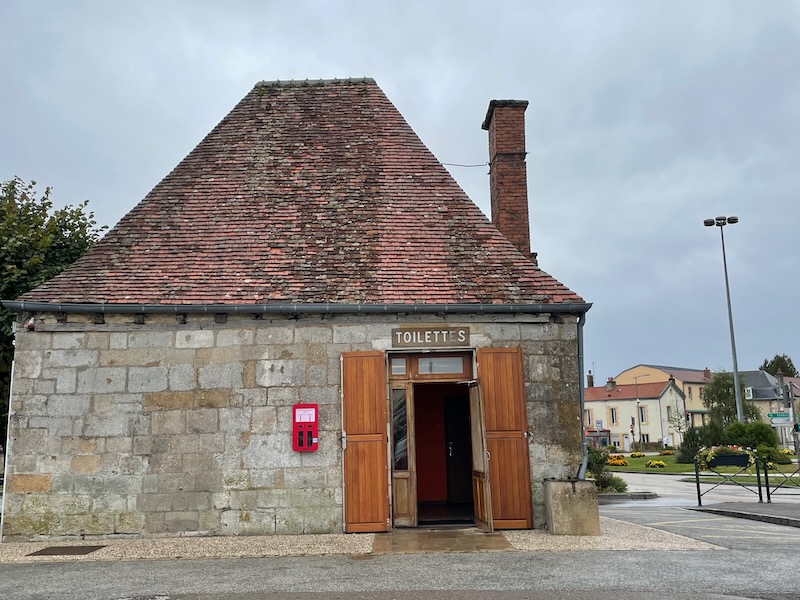 Public toilets come in all shapes and sizes! Here, an ancient building houses the facilities at the entrance to the walled town of Langres, in eastern France
Public toilets come in all shapes and sizes! Here, an ancient building houses the facilities at the entrance to the walled town of Langres, in eastern FranceWhen it comes to menus or hotel rooms, you can always act it out or use your hands if you need to.
But a bathroom? Not so easy! At least not in polite company…
There are so many ways to translate bathroom to French!
While in English we might use bathroom, toilet or restroom interchangeably, this is not the case in French, where each word has a slightly different meaning.
I'll explain these in detail, but will consistently use "bathroom" in English unless there is a solid alternative.
1. Les toilettes
This is the standard, most acceptable word for bathroom or toilet in French. You can use it in most circumstances (although I wouldn’t mention it in the middle of a meal) without sounding vulgar or rude.
For some reason, this word for bathroom in French is always plural. I know, it's odd, but you say "where are the bathrooms" as opposed to "where is the bathroom".
Doesn't matter – it gets you to the right place.
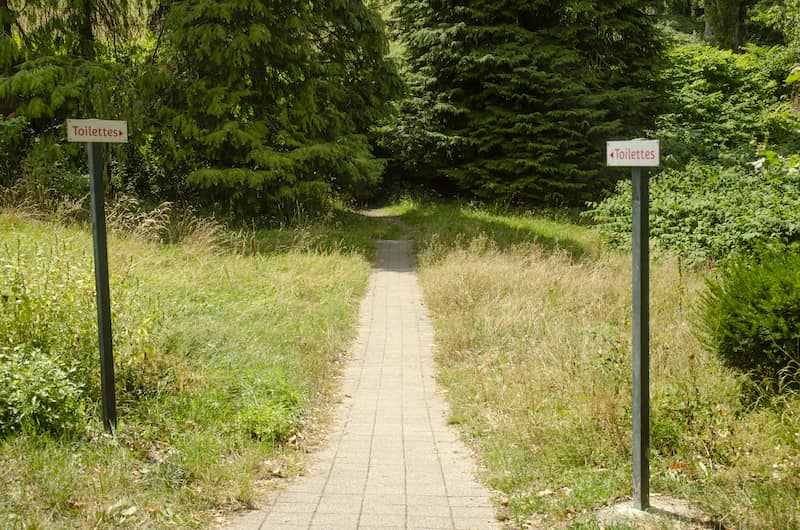
(As mentioned above)
The bathroom. Les toilettes.
Where is the bathroom, please?
Où sont les toilettes, s’il-vous-plaît?
🇫🇷
2. Les cabinets
I can't get agreement on this one. Some of my friends use it, some wouldn't. There's nothing wrong with it – it's just not in their vocabulary.
To me this French word for toilet sounds a bit strange but I really think this one is a matter of personal taste, habit, and region.
Use it to ask for a restroom in French if you like, but it's not as common as "les toilettes".
Where.
Où.
Where is the bathroom, please?
Où sont les cabinets, s’il-vous-plaît?
🇫🇷
3. Les WC
This is a relatively common term but is actually quite old, dating back to the 18th century and extracted from the English water-closet (which, by the way, is also used in French, albeit mispronounced).
I wouldn’t ask for the bathroom with this phrase, which is pretty colloquial, probably more in use among groups of young friends than in other cases.
If you’re in a restaurant or cafe, avoid this, BUT – you may see the French bathroom sign on the door: WC, or les WC. At least you’ll know what it is when you see it! (Most often, though, you’ll see a simple silhouette of a man or woman).
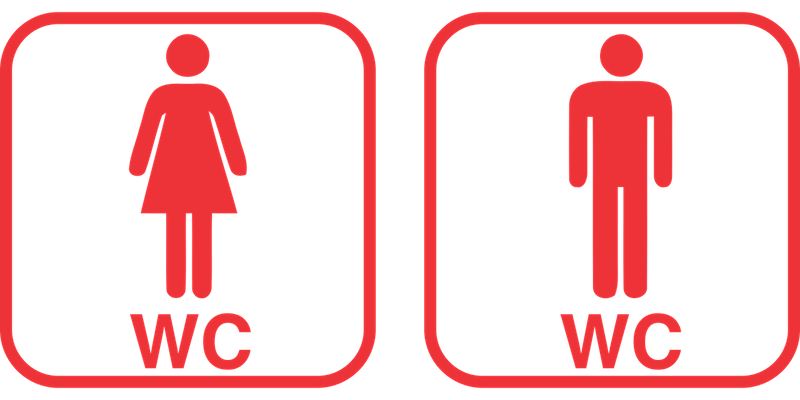
The loo or water closet.
Les WC. Les waters.
Where is the loo/water closet, please?
Où sont les WC, s’il-vous-plaît?
Où sont les waters, s’il-vous-plaît?
🇫🇷
4. Le petit coin
This is a “cute” phrase in French for bathroom and one you won’t hear that often. It tends to be used with children, or among close friends, less often with strangers.
I do have an adult friend who uses it all the time – but I don’t hear it often otherwise.
If you used this word, you’d probably elicit a giggle but everyone would know exactly what you mean. Literally, it means "little corner".
Where is the bathroom (little corner), please?
Où est le petit coin, s’il-vous-plaît?
🇫🇷
5. La salle d’eau
This usually refers to a room with a water conduit, most often with a shower but no bathtub or toilet. The lack of a toilet is nothing strange, because in France, the toilet is usually separate from the shower and bath, and sits in its own little room.
Occasionally, the term might be used to refer to a room that has water but no toilet, like a pantry or laundry room.
That said, you would rarely ask for it by name.
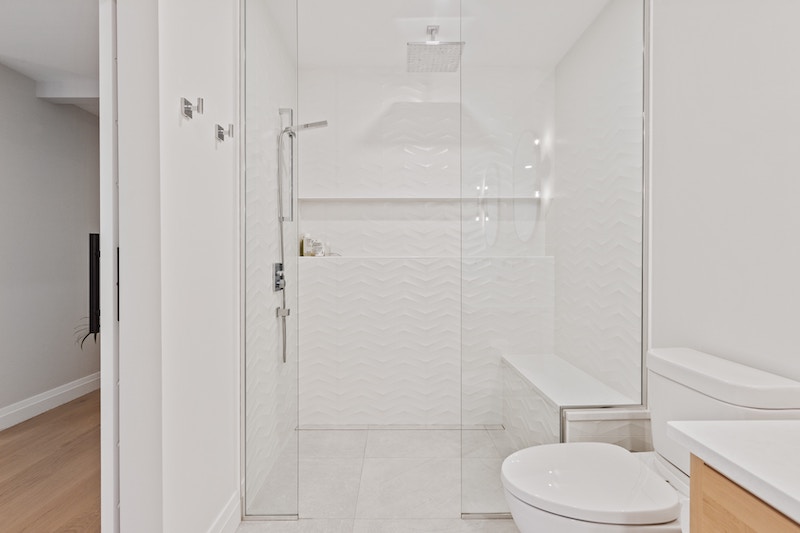
The "room with water" - there is no real English counterpart.
La salle d'eau.
🇫🇷
6. La salle de bains
You’ll often see this as “the” translation for bathroom – but that would only be partially correct. If the room in question has a bathtub or shower then yes, you can use this term.
But if all you’re looking for is the toilet, then no, this is not the word you use (unless you want to take a shower while you’re at it!)
“Salle de bains” refers to that part of the bathroom that contains the shower or bathtub and, in more old-fashioned (or luxurious) homes or hotel rooms, a bidet. (A bidet, by the way, is where you wash your private parts by sitting on it and facing the taps, which are usually against the wall.)
As I mentioned earlier, in France, the washing facilities are often separate from the toilet.
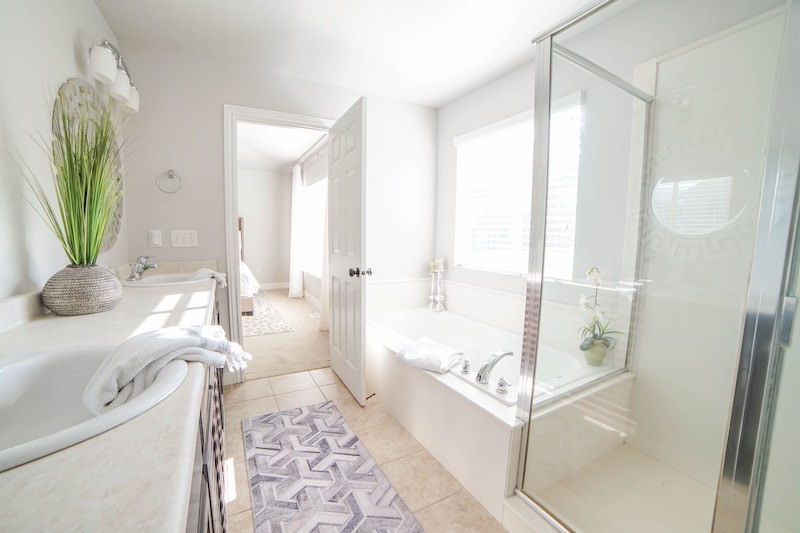
Full bathroom.
Salle de bains.
Does this room have a full bathroom?
Est-ce que cette chambre a une salle de bains?
🇫🇷
7. Cabinet de toilette
Not to be confused with "les cabinets" higher up on this list, this is a relatively old-fashioned word, and usually refers to a small corner with a sink, or perhaps with a bidet. It tends to be in a separate room.
Usually, though, it has no toilet. It’s the kind of corner you might find in a sleeper train, or outside the toilet in a cafe or restaurant, where you can wash your hands before going back into the main room.
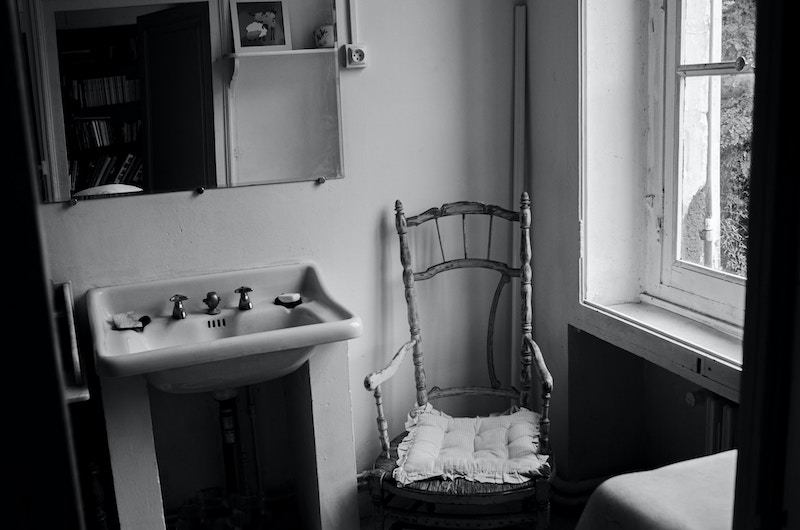 Photo by Philippe Murray-Pietsch
Photo by Philippe Murray-PietschHand/wash basin.
Cabinet de toilette.
Does the compartment have a hand/wash basin?
Est-ce que le compartiment a un cabinet de toilette?
🇫🇷
8. Un trône
This is not something you’d use unless you’re actually buying a toilet in a shop. It’s old-fashioned and refers more to the actual toilet fixture than it does to the room. And frankly, I've never heard it used (which doesn't mean it isn't, of course!)
Porcelain toilet.
Un trône.
Do you have a porcelain toilet?
Avez-vous un trône de porcelaine?
🇫🇷
9. L’urinoir (also known as la pissotière, la vespasienne, le pissoir)
You’ve got this – all these words mean urinal, and they're extremely common – and visible in France. You'll often see them through an open door – along with those using them – as you head for the ladies' room
But as is the case in English, the word "urinal" is rarely used, and not in polite society. In places with no bathroom but with a urinal, you might be directed towards it, but it is quite rare. These words refer mostly to times gone by, when men’s public urinals were common.
It's simpler to just ask for a toilet in France.
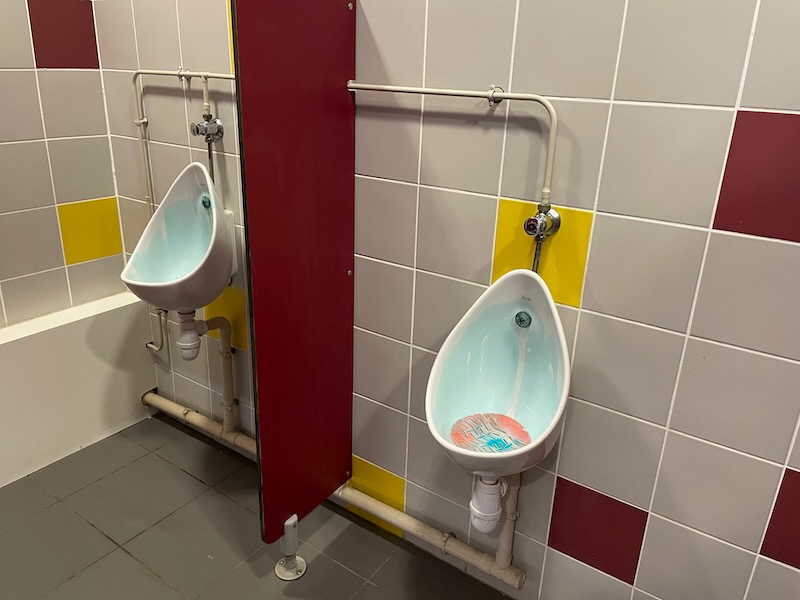 Modern urinals, as often found in gas stations or similar high-traffic places
Modern urinals, as often found in gas stations or similar high-traffic places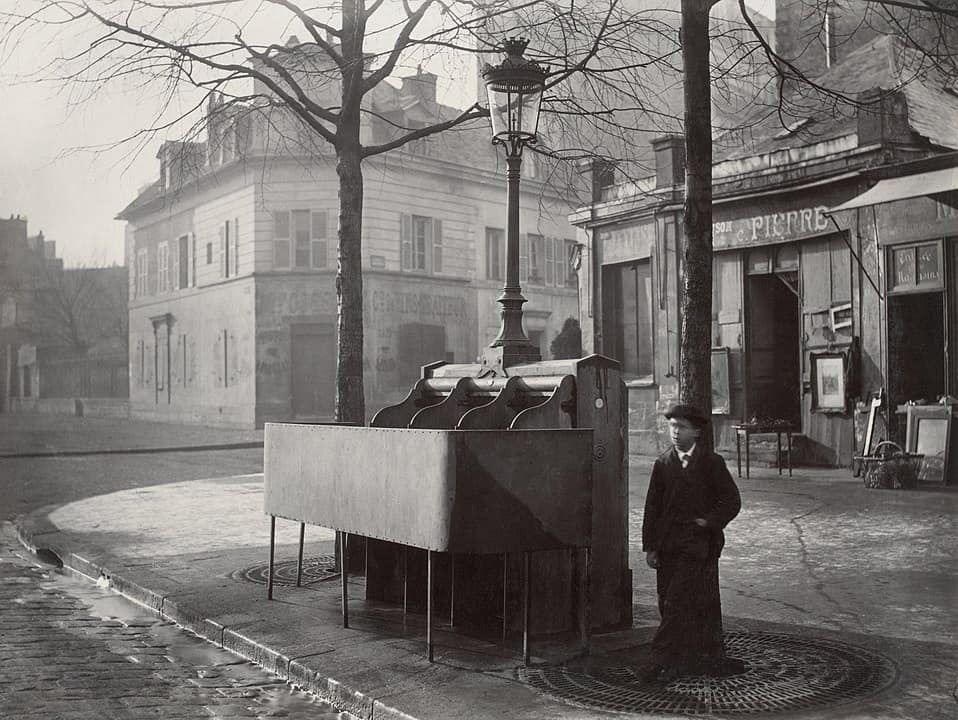 Old-fashioned French urinal, often called a Vespasienne. Photo by Charles Marville, around 1865
Old-fashioned French urinal, often called a Vespasienne. Photo by Charles Marville, around 1865Urinal in its various forms.
L’urinoir, la pissotière, la vespasienne, le pissoir.
There’s a urinal over there.
Il y a un urinoir là-bas.
🇫🇷
10. Public toilets / Toilettes publiques, Sanisette
Sometimes, the toilet may be out of order where you’re going, or you may not like what you see, prompting you to ask whether there is a public toilet nearby. Usually, this happens when you’re caught outside with a need to go and don’t particularly want to drink yet another coffee to use the facilities.
Some of these are old-fashioned, with an attendant (“Dame Pipi”) who collects a few coins in exchange for keeping the facilities clean. Most often these days, though, they are coin-operated. You may have seen them in France – they’re quite common in urban areas. Even my tiny village of fewer than 2000 people has one.
In some instances, you might come across the term Sanisette, a special kind of public toilet available in Paris (here's a map of where to find them) and across decent-sized towns. Originally, it was a brand name but like so many, it has been coopted into the language. Many of them are now free.
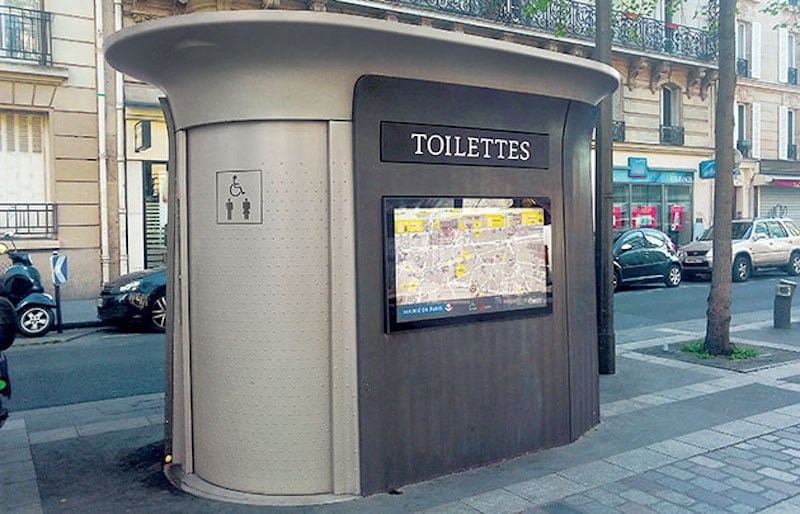 ©OTCP
©OTCPAre there any public toilets near here?
Y-a-t’il des toilettes publiques près d’ici?
Where is the Sanisette?
Où est la Sanisette?
🇫🇷
11. Commode / Cabinet d’aisance
This is very rarely used and quite old-fashioned – and refers to a seat with a hole in it.
It could refer to a normal toilet, or to the type Louis XIV might have used, which these days you’re more likely to find in a museum.
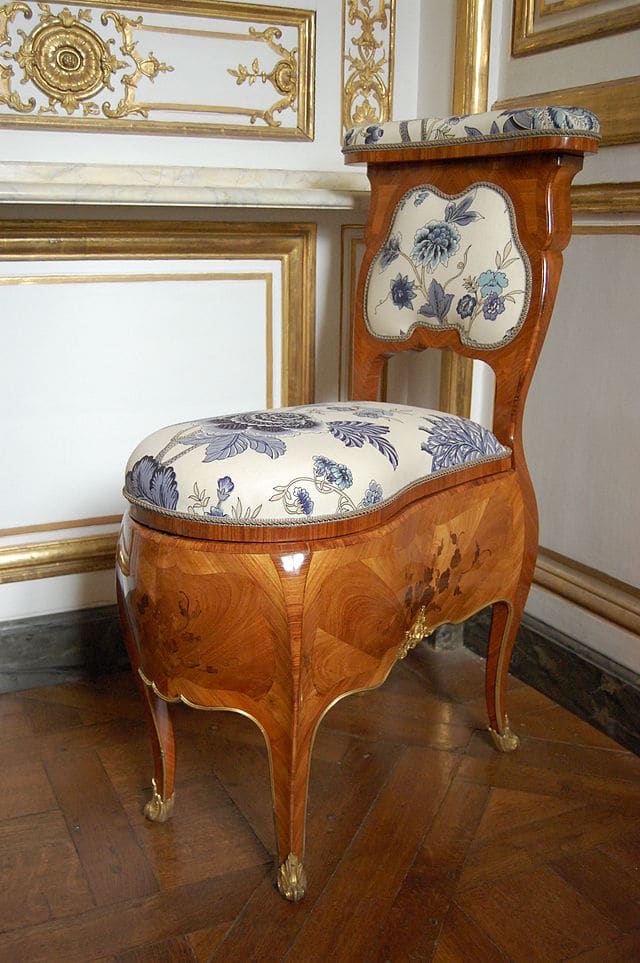 Madame de Pompadour's (Louis XV's mistress) toilet seat - called a chaise percée or a cabinet d'aisance. The top lifts up for use
Madame de Pompadour's (Louis XV's mistress) toilet seat - called a chaise percée or a cabinet d'aisance. The top lifts up for useDoes the exhibition have a commode on display?
L’exposition a-t-elle un cabinet d’aisance?
🇫🇷
12. Les chiottes
Very common, but very colloquial and vulgar.
Ask for these in a nice restaurant and your reservation might magically get misplaced. This is not a word you’d use, and you’ll raise eyebrows if you do. But, if you hear it, at least you’ll know what it means.
Where is the “crapper”?
Où sont les chiottes?
🇫🇷
How to ask for the bathroom in cafés and restaurants
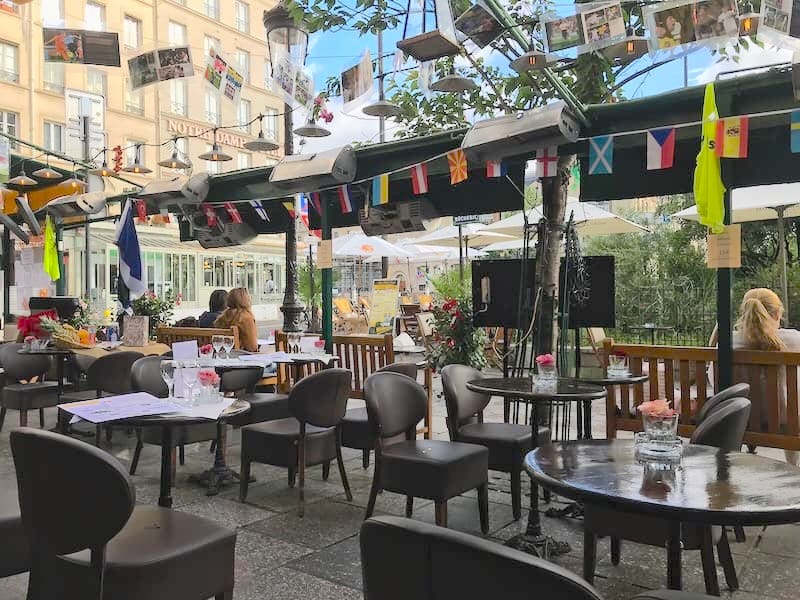
A café is your best bet if you're in a rush: even the smallest towns have one.
Have your coffee, then ask where the toilet is – it’ll usually be upstairs or downstairs or behind the bar (see the box below for directions).
In an emergency, if you can't wait for coffee, just look desperate and ask nicely "Où sont les toilettes, s'il vous plaît?" You'll rarely be turned away.
AND WHERE EXACTLY IS THE BATHROOM?
The toilet is… Les toilettes sont…
- Upstairs - en haut
- Downstairs - en bas
- To the left - à gauche
- To the right - à droite
- Behind - derrière
- In front of - devant
- Outside - dehors
- In the hallway - dans le couloir
🇫🇷
Useful words and phrases for your hotel bathroom
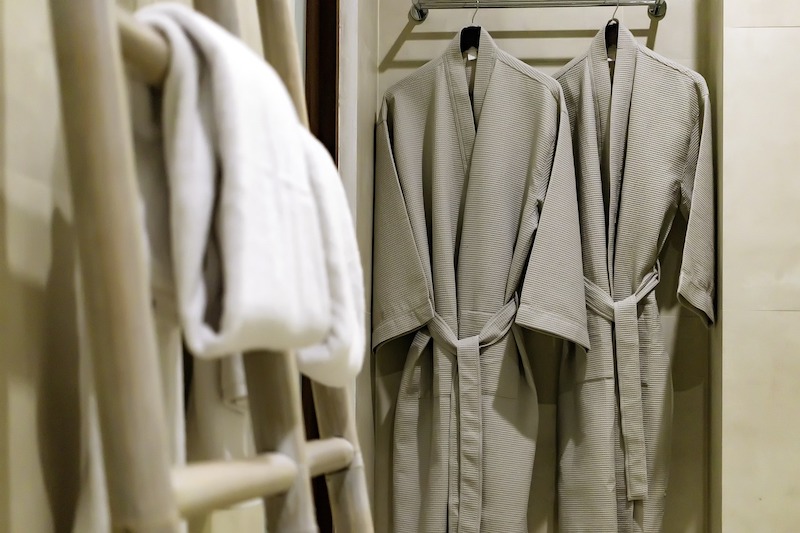 Bathrobes - des robes de chambre
Bathrobes - des robes de chambreBathroom accessories - French equivalent
- The (full) bathroom – la salle de bains
- The flush cord or handle – la chasse d’eau
- The faucet, tap – le robinet
- The mirror – le miroir
🇫🇷
- The bathtub – la baignoire
- The shower – la douche
- The garbage can or bin – la poubelle
- The bathroom sink – le lavabo
🇫🇷
- A bath mat – un tapis de baignoire
- A non-slip shower mat – un tapis antidérapant
- A bathroom scale – une balance
- A shower curtain – un rideau de douche
🇫🇷
- A shower stall – une cabine de douche
- A bidet – un bidet
- A hamper – un panier (à linge)
- A face cloth – un gant de toilette
🇫🇷
- Soap – du savon
- A soap dish – un porte-savon
- The toilet seat – la lunette des toilettes, le siège de toilette
- A towel rack – un porte-serviettes
🇫🇷
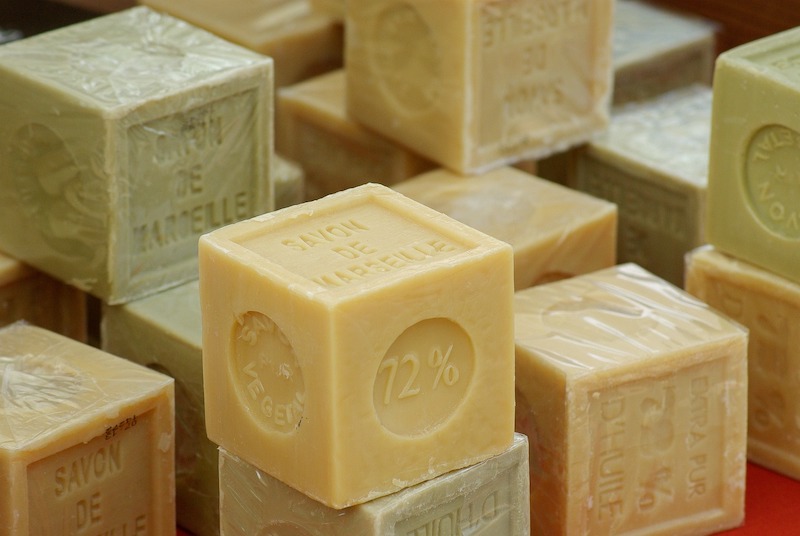 Soap - du savon
Soap - du savonBathroom items in French
- A bathrobe – un peignoir
- A hair dryer – un séchoir à cheveux, un sèche-cheveux
- Shampoo – du shampooing
- A hairbrush – une brosse à cheveux
- A comb – un peigne
🇫🇷
- Conditioner – un après-shampooing
- Toothpaste – du dentifrice
- A toothbrush – une brosse à dents
- Dental floss – du fil dentaire
- Mouthwash – un bain de bouche
🇫🇷
- A towel – un essuie-mains
- A bath towel – une serviette de bain
- A bubble bath – un bain moussant
- Paper towels – des serviettes en papier
🇫🇷
- A razor – un rasoir
- An electric razor – un rasoir électrique
- A Q-tip – un coton-tige
- Scissors – des ciseaux
- A tissue – un mouchoir en papier, un Kleenex
🇫🇷
How to ask for toilet paper in French
Do you have…?
- Toilet paper – du papier de toilette, du papier hygiénique
- Hand gel – du gel pour les mains
- A sanitary napkin – une serviette hygiénique
🇫🇷
How to say "poop" in French?
Frankly, you don't. It's rude and vulgar, and simply not part of a normal French conversation.
There is only one French word for poop that is acceptable: Merde.

"Merde" is the one such word you can use in everyday society. It has lots much of its original meaning and is simply a normal expletive, even less vulgar than its English counterpart. It's the kind of word you'll hear when someone bumps into something, or forgets their keys, or runs out of sugar in the middle of a recipe.
As children, we were taught to ask permission to visit the toilet for either "la petite commission" or "la grande commission". In other words, the little event, or the big event. We may be relatively comfortable with nudity, but we are distinctly ill at ease with discussing bodily functions.
But because you asked for the French word for poop, here's what I know: caca, crotte, déjection, selles... and probably many I haven't heard yet. Just avoid them altogether unless you're in a medical setting.
Merde, caca, crotte, déjection, selles
🇫🇷
Less used, old-fashioned or obsolete French words for bathroom
These words run the gamut from vulgar to archaic, but you should at least know they exist!
FRENCH WORDS FOR BATHROOM THAT YOU PROBABLY WON'T BE USING
- chaise percée (pierced chair, as would be used in a Renaissance palace)
- commodités (utilities, comforts, in GB mod cons)
- gogue (slang)
- goguenots (archaic for bedpan)
- isoloir (usually a voting booth but could be a stand-alone toilet)
- là où le roi va tout seul (the place where the king goes alone... archaic for sure!)
- latrines (toilet without plumbing – trench, hole in the ground, bucket)
- lieu d'aisance (old-fashioned for toilet)
- pipi-room
- sanitaires (the bathroom setup – toilet, tub, sink, bidet, shower, plumbing)
- sentine (bilge, or dregs)
- tinette (portable, like a bedpan)
🇫🇷
Where to find bathrooms in France
So you want to go? Can’t wait? Where to find a toilet as you travel in France - not all that common - - and by the way, use it when you see it
- Café: Your first logical stop should be a café. For the cost of a coffee, you’ll be able to use a toilet that has probably been cleaned recently.
- Restaurant: If you happen to be in one, take advantage of the facilities before you leave.
- Department stores: Most large department stores will have toilets, probably a few floors up. They do want to keep you in the store as long as possible and don’t want you leaving just to find a restroom…
- Malls: Most malls have restrooms, and you’ll usually find either a pictogram or the words “WC” or “Toilettes” leading you towards them. They tend to be easy to find.
- Train stations: Most train stations have bathrooms. I say most, because some smaller or rural train stations do not, so don’t absolutely count on going before you hop on your train. You’ll have to wait until you’re ON the train. In big French cities, however, the train station will usually have facilities (though you will probably have to pay for them).
- Franchises: Walking by a Starbucks? A MacDonald’s? You’re in luck! They usually have walk-in toilets. In larger urban areas, you may need a code to enter, but not usually in smaller towns.
- Public toilets: Many towns and city neighborhoods have public, coin-operated toilets in highly frequented areas. These are clean (they are cleaned automatically between uses) and safe, so if you have no other options, don’t be afraid.
- Outside. Can’t find one and thinking of using the street? You’ve seen many men do this in France? Well, Don’t! It’s against the law. You can be fined somewhere between 68-135 Euros (different people report different fines!). Not only is it disgusting and disrespectful for everyone around you, but… how embarrassing if you do get caught!
French bathroom phrases you might need once you've been…
- The toilet is blocked – les toilettes sont bouchées
- The light doesn’t work – la lumière ne fonctionne pas
- There is no more paper – il n’y a plus de papier
- The sink is overflowing - le lavabo déborde
- The toilet won’t flush - la chasse d'eau ne marche pas
- The floor is dirty / wet - le sol est sale / mouillé
🇫🇷
English bathroom phrases that don't translate too well
It's not just about knowing the right words – you also need to formulate the question appropriately. Here are some examples of phrases that don't really translate or that aren't used in French:
- May I go to the bathroom? In French you wouldn't ask for permission – you would just want to know where it is.
- I need a bathroom. This is too much information. Simply ask where it is.
- I need to use the bathroom. In French, this too is too much information. Just ask where it is.
- How to say I have to poop in French. No, you would NEVER say this to anyone! And perhaps my English is failing me, but I cannot imagine any circumstance in which I would ask in English! Yet people are asking this question... a lot...
ATTENTION GRAMMAR NERDS!
du, la, un - for grammar nerds
French is one of those languages in which everything has a gender – it’s either masculine (m) or feminine (f). There is no logical reason for a word being one or the other. It just is. This is not a grammar lesson so I won’t go into detail BUT, you should know this, at least:
- Some = du (m), de la (f)
- The = le (m), la (f)
- A = un (m), une (f)
In each example, I’ve used the one that seemed most logical, for example, where is THE bathroom, not where is A bathroom...
Toilets in France: Do’s and Don’ts
- Use the brush: You’ll usually find a small toilet brush next to the bowl. If you make a mess, use it! So that the next person will find a clean toilet.
- Don’t assume you can flush anything: In North America, plumbing is different and there are plenty of biodegradable items you can flush. Not so in France. Most toilets can only handle toilet paper. My own home in the French countryside has a septic tank and if you flush something that gets stuck, it could cost me hundreds to have someone come over and fix it. Look for a little bin or garbage can nearby.
- Don’t talk about bodily functions: It’s just not done. In some countries, even during a meal, you can simply say, “I’ll be right back, I’m just going to the bathroom.” In France, it would be more polite to simply say, “Excuse me, I’ll be right back.” In French: "Excusez-moi un instant." No need to tell anyone where you’re going, or why. We don't really want to know.
- Don’t assume all bathrooms are free: Many are, especially those in consumer establishments. But those in train stations will cost a euro or two. In some places, parks or certain monuments, you may still find a “Dame Pipi”, an attendant who keeps the facilities clean in exchange for a few coins. Of course you’ll have to pay for automated public toilets.
- Do have a few coins with you: At all times, just in case.
- Do learn about the two-step flushing process: The common French toilet has two buttons with which to flush. A smaller one if only liquids are in the bowl, and a larger one for solids. Use the small one to conserve water if the bowl contains only liquids.
- Do learn about the different flushers: While most toilets in France use a button to flush, not all do and you may find other mechanisms: a push handle, a cord, a motion sensor… this is one of those non-uniform things.
- Do know how to turn your smartphone light on: For some reason, France is very partial to motion sensors in bathrooms. Sadly, they often don’t work, so if you want to avoid having to jump up and down while waving your arms madly, have a light handy.
- Don’t pee outside: We mentioned this one already. Once upon a time in France, it was perfectly acceptable, but no more – although that doesn’t seem to stop anyone. Don’t be that person.
- Do take advantage of any bathroom you meet: You never know when you might come across the next one, so… bird in hand. Just go, even if it’s not urgent.
- Don’t be surprised if you’re faced with a Turkish (squat) toilet: They still exist in France, though they’re not common anymore. As recently as 1946, 38% of rural households had no indoor bathrooms. In 1955 (that’s during my lifetime!), 84% of people in cities had no shower or bathtub in their homes…
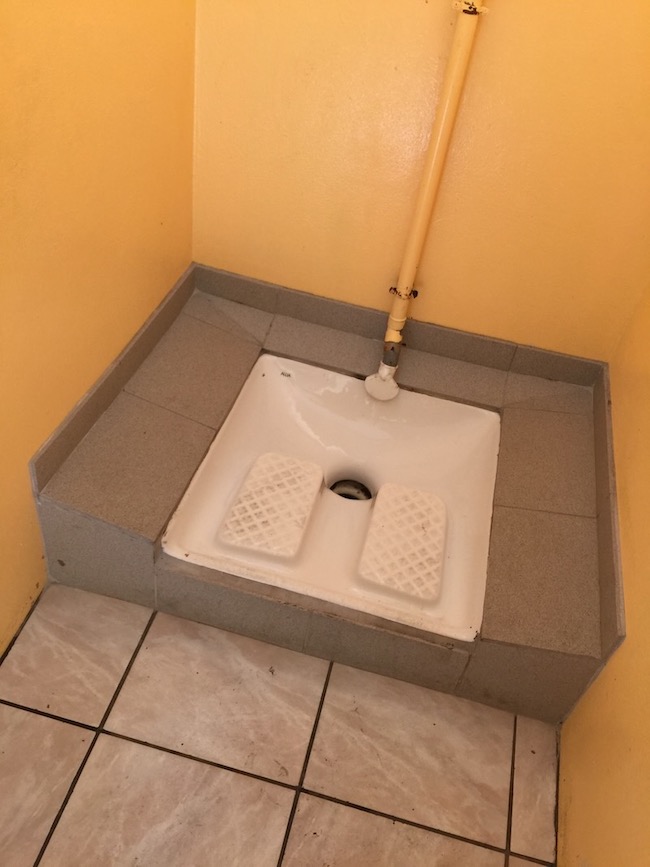 I took this shot not that long ago in an upmarket mall - a Turkish toilet, or toilette Turque. There were western ones as well and you could choose... I wonder if they're still there! I'll have to go and check.
I took this shot not that long ago in an upmarket mall - a Turkish toilet, or toilette Turque. There were western ones as well and you could choose... I wonder if they're still there! I'll have to go and check.FAQ: How to say bathroom in French
How to say: where is the bathroom, in French (please)?
How to say: where is the bathroom, in French (please)?
Easy! Où sont les toilettes, s'il-vous-plaît?
How do you say can I go to the restroom in French?
How do you say can I go to the restroom in French?
In French, you don't get into this much detail. Instead, you would ask about the bathroom's location and ask, where is the bathroom, please?
How do you say, can I use the bathroom in French?
How do you say, can I use the bathroom in French?
It's the same answer. You wouldn't tell a French person that you wanted to use the bathroom – it's just too much information. Just stick to "where".
How to say: do you have toilets here?
How to say: do you have toilets here?
You could again ask where they are, which would be perfectly correct, or if you really want to ask whether they have toilets, you would ask: "Avez-vous des toilettes ici?"
And finally... what does "we we" mean in French?
If I add this, it's because it seems to come up regularly as a question! People also ask, "What does wee wee mean in French"?
Some people believe it has a bathroom connotation, but it does not.
In fact, in French, it's OUI, OUI!
And it means... YES, YES!
And with that, I hope you've had all your bathroom questions answered!
Did you enjoy this article? I'd love if you shared it!

